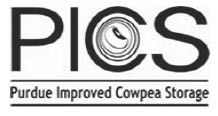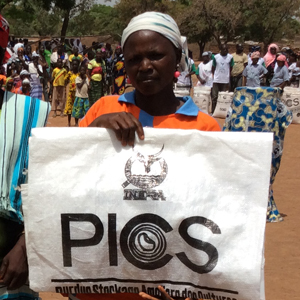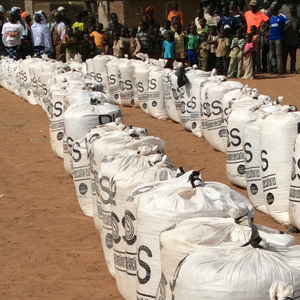PICS 1
Overview
(2007 – 2014) Improved Cowpea Storage (PICS1) was a five-year project to improve cowpea storage in West and Central Africa. The goal of the PICS1 project was to have 50% of the cowpea production in West and Central Africa stored using our non-chemical, triple bagging hermetic method by the year 2012. If 50% of cowpea grain at the farm level were put into airtight storage (PICS bags are one type), overall annual income in the region would increase by $255 million. The PICS1 project was implemented in 10 countries in West and Central Africa, including Nigeria, Niger, Burkina Faso, Ghana, Mali, Senegal, Cameroon, Benin, Togo and Chad. The PICS1 project goal was to disseminate the triple-layer sack technology in 28,000 villages in West and Central Africa. The specific objectives of this project were to:
- determine the best design for a one-piece commercially available triple-layer plastic cowpea storage bag;
- disseminate information on non-chemical cowpea storage methods to extension services, non-governmental organizations (NGOs) and farmers;
- demonstrate the most effective cowpea storage methods in each village in the major cowpea areas of West and Central Africa; and
- develop a supply chain for triple-layer plastic sacks to make the technology available to farmers and provide opportunities to local businesses.
This project was a joint collaborative effort involving various partners including international agricultural research centers, local and international development NGOs, National Agricultural Research Institutes, government agencies, private entrepreneurs, and farmers. At Purdue, four departments and one unit were involved including Agricultural Economics, Entomology, Food Science, and Youth Development and Agricultural Education and the International Programs in Agriculture. The PICS1 project was funded for $12.0 million by the Bill & Melinda Gates Foundation.
Team Members
- Hippolyte Affognon; ICIPE, Kenya
- Corinne Alexander; Agricultural Economics, Purdue University
- Ibrahim Baoua; INRAN,Niger
- Dieudonne Baributsa; Principal Investigator, Purdue University
- Carole Braund; PICS Program Assistant; Purdue University
- Clémentine Dabiré; INERA, Burkina Faso
- Heather Fabries; PICS Trademark, Purdue University
- Jess Lowenberg DeBoer; PICS Co-Principal Investigator, Purdue University
- Bokar Moussa; INRAN, Niger
- Larry Murdock; PICS Co-Principal Investigator, Purdue University
- Jacob Ricker-Gilbert; Agricultural Economics, Purdue University
- Charles Woloshuk; Botany and Plant Pathology, Purdue University
Our Partners
North America
- Purdue University
- Bill and Melinda Gates Foundation
- USDA
- USAID
- FINTRAC
Africa
Benin
- International Institute of Tropical Agriculture (IITA)
- Centre Régional pour la Promotion de l’Agriculture (CeRPA)
Burkina Faso
- Institut de l’Environnement et de Recherches Agricoles (INERA)
Camaroon
- International Institute of Tropical Agriculture (IITA)
- Institut de Recherche Agricole pour le Development (IRAD)
- Program Nationale de Vulgarisation et de Recherche Agricole (PNVRA)
Chad
- Association d’Appui aux Initiatives Locales de Developpement (ASSAILD)
- Centre Chretien D’Appui au Developpement Communautaire (CECADEC)
- Institut Tchadien de Recherche Agronomique pour le Developpement (ITRAD)
Ghana
- World Vision International (WVI)
- Council for Scientific and Industrial Research/Savanna Agricultural Research Institute(CSIR/SARI)
- Ministry of Food and Agriculture (MOFA)
Mali
- World Vision International (WVI)
- Institut d’Economie Rurale (IER)
Niger
- Institut National de Recherche Agronomique (INRAN)
- Catholic Relief Services (CRS)
- World Vision International (WVI)
Nigeria
- International Institute of Tropical Agriculture (IITA)
- Agricultural Development Programme (ADP)
- Bayero University of Kano
- Initiatives for the Promotion of Green Resources (PROGREEN)
- Research Into Use (RIU)
Senegal
- Conseil des Associations de Développement Communautaire (CADEC)
- Institut Sénégalais de Recherches Agricoles (ISRA)
- Agence Nationale de Conseil Agricole et Rural (ANCAR)
Togo
- International Institute of Tropical Agriculture (IITA)
- Program Nationale de Vulgarisation et de Recherche Agricole (PNVRA)
- Institut de Conseil et d’Appui Technique (ICAT)
Impact
Over the five-year life of the Purdue Improved Cowpea Storage (PICS) project, PICS reached approximately 1.7 million households and increased total income in the region by $255 million. During that time, the PICS project distributed triple-bag technology to 30,800 villages and taught more than 1.6 million participating farmers how to use the bags to save their cowpeas from destructive weevils. PICS bags have reached villages in 10 different countries in West and Central Africa.Because cowpea prices often double or triple from harvest time lows to seasonal highs in the months before the next harvest, a farmer’s ability to store the cowpeas also increases family income. By using the bags, a farm family income may rise by $150/year—a significant increase where most live on about $2/day.PICS technology also gives local manufacturers the opportunity to produce and sell PICS bags. Over the last five years, manufacturers and local businesses produced and sold more than two million PICS bags in West and Central Africa.Additionally, African entrepreneurs are finding new business opportunities in purchasing the PICS bags from manufacturers and selling them to farmers through their retail networks.




